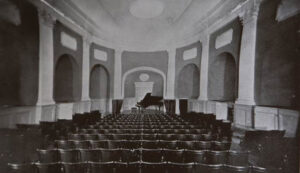IN A MONUMENTAL MOMENT OF HISTORY

From left, Steinway CEO Ron Losby with Steinert's Paul Murphy, Brendan Murphy, and Jerome Murphy.
How do you celebrate 160 years of uncompromised service during a global pandemic? M. Steinert & Sons – believed to be the oldest American music store in continuous operation – is finding a way. The business has survived countless challenges, enduring many of them while anchoring the city’s Piano Row District.
Morris Steinert emigrated from Germany to the United States, eventually settling in Georgia in 1860. A master of multiple instruments, he worked his way north at the onset of the Civil War as a piano teacher and tuner. Among his many musical endeavors, he formed a family band that became the New Haven Symphony Orchestra.
In 1869, Morris inked an agreement to sell pianos with William Steinway. It remains one of the longest business partnerships in the nation. “The relationship between M. Steinert & Sons and Steinway & Sons has endured from generation to generation because both companies share a common goal of bringing the best quality instruments to market,” says Steinert President Paul Murphy Jr. “The Steinway piano is the reason Steinert has been in business for 160 years,” adds Brendan Murphy, Vice President and Director of Institutional Sales.

Morris established headquarters at 162 Boylston Street in 1896. He hired a young bookkeeper, Jerome Murphy, starting a new family pedigree forever linked to the fortunes of M. Steinert & Sons.
Like William Steinway, Morris’ son Alexander was business savvy. To promote live music, he constructed Steinert Hall some 40 feet below street level in the basement of the six-story building.
Steinway immortals Ignace Paderewski and Sergei Rachmaninoff were two of many star performers. “Among operatic singers of international renown, the Hall was called the “Little Gem” because of its fine acoustic properties,” recalls Paul Murphy Jr.
For years, Steinert ordered hundreds of Steinways as the business expanded to more than 40 stores in New England and New York. Hard times following the Great Depression, coupled with Alexander’s death, brought Steinert close to the edge. In 1934, with the Steinway partnership still intact, Jerome Murphy went on to acquire the assets and rescue the company by focusing solely on the piano business.
Steinert’s iconic treble clef is a staple fixture on Boylston Street.
“M. Steinert & Sons has survived all manner of ups and downs artistically and economically a year before the first shot was fired at Fort Sumter,” notes Brendan Murphy. “While the piano industry has been in decline for many years, we strive to manage the company in a fiscally responsible way. Demand for high-quality instruments remains steady and we plan to serve our market for generations to come.”